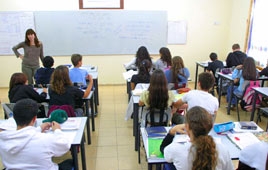
Meitzav examination results: Pupils barely pass math
Israeli students’ marks on the standardized Meitzav exams continue to drop. The average math score for fifth graders this year was only 56.9% as compared to 67% last year. English and science scores also decline. Exam scores in Arab schools are even lower; 15% of students indicate that they are subject to violence at school
The “Meitzav” exams, a Hebrew acronym for school growth and efficiency indicators, are standardized tests that are given to pupils countrywide at the end of the each school year. They are meant to specify just how well Israeli junior high and high school pupils are meeting the benchmarks and standards specified in school curriculums.
As it turns out, Israeli pupils really do not know their way around number lines, fractions, geometry and basic measurements. The average Meitzav math score amongst Jewish pupils was a meager 61.3%; while the Arab sector fared far worse with a failing math score of 45.9%. The average math score last year among Israeli pupils was 67%. This is a significant drop indeed, though the Ministry of Education claims that test standards have changed, and so there is no real basis for comparison.
Test scores drop in English, science
The average science and technology “Meitzav” score amongst fifth graders also dropped significantly this year, from an average of 72.5% last year to a current 68.8%.Scores in Arab schools stood at only 60%, and were 12 percentage points lower than those in the Jewish sector. The science Meitzav exam assesses scientific thought processes and technological know-how amongst students, and covers topics such as energy and matter, ecology, the environment and conservation, health and wellness and others.
The English “Meitzav” continued the trend of dwindling test scores, with fifth grade scores dropping from last year's 73.5% to 72.5%. Arab schools again produced far lower results, scoring at only 68.6% as compared to 74.2% in the Jewish sector.
Fear not, however, there is also some good news for our pupils. Second graders fared relatively well on their Hebrew language arts “Meitzavs”, earning an average score of 85%. This shows a significant increase from last year's 77%. Fifth graders scored slightly lower on their Hebrew Meitzavs, with an average score of 79%.
Education Minister Yuli Tamir, commenting on these results, indicated that pupils’ socio-economic status, as well as parental education, both play a pivotal role in their ability to succeed at school. “This education gap is already in place long before students enter the classroom, “said Tamir. “We can only hope that reforms instituted at the primary school level can help remedy this situation.”
Teachers, on their part, blame the students themselves for these plummeting test scores, noting that students are either unwilling or unable to do well in school. They also indicated that lack of parental involvement and socio-economic woes are major factors leading to failing test scores. They failed to mention the schools, the curriculum, or the quality of instruction itself as factors leading to student success or failure.
Many students, incidentally, stated that teachers actively taught for the “Meitzav” exam itself, forgoing real instruction and the actual curriculum.
Homework and more…..
What are Israeli schools and pupils really like?
Polls conducted among Israeli students indicate, first and foremost, that they are not overly fond of homework. Only 6% of students spend more than three hours a night doing their homework, where as the majority, 47% only spend between an hour and two each night “hitting the books”.
Violence also appears to be a major problem in Israeli schools, with 15% of Israeli students reporting that they have been victims of violence (ranging from pushing, punching and hitting to outright bullying and extortion) during the previous month.
As for Israeli teachers, in general they appear to be fairly content, in spite of often difficult work environments. Eighty-six percent of Israeli educators in first through ninth grade reported that they were “fairly content” at their jobs. The majority of teachers (70%) also reported being fairly happy with their schools.










